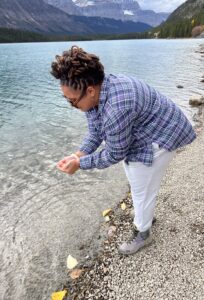
Carrying Water: Pedagogical Ritual in Practice
In her series of blog posts, “What Ritual Does,” Itihari Y. Toure elucidates the potential of ritual for teaching – reminding us of how ritual engenders “communal learning,” “extends the depth of our imagination,” brings us “into a divine dance,” and functions as a “restorying” activism. I am a witness: ritual does all that Toure says and more. I am a believer: ritual is an essential teacher. I can testify: ritual opens us to surprising learning possibilities – and Toure brought the pedagogical power of ritual to life in new ways during a Wabash workshop for faculty of African descent.
Building on some of the ritual lessons we learned with Toure in the workshop, I have been exploring water as a ritual conductor. Toure writes: “We imagine a portal, a doorway in liminal spaces and to our delight, the ritual affords the opportunity to be in liminality and create.” Water becomes a tangible portal of the intangible: receiving our gifts, our gratitude, our hopes, our intentions, and our manifestations. Through water we feel matter, we sense touch, we know wetness, we acclimate ourselves with temperature. Water, for me, is a substance through which I can know that the personal is pedagogical – and how.
Water with Colleagues. In our workshop we were reminded of how water receives the vibrational patterns of our hearts’ desires expressed as spoken word, and that in its evaporation what we have spoken can be manifested. Does water manifest the desired and spoken outcome? Perhaps the answer to this question matters less than the vulnerability of speaking into water – open to this possibility – and (working and) watching to see what follows. When we considered this ritual potential of water together in a community of colleagues, one of the most extraordinary gifts of this collective contemplation was the mutual sharing this engendered. We pour water. We speak into water. We wash with water. We rinse with water. We drink water. We share water. We create with water. We pass through water. We transition in water. We are born of water. We learn water. We teach water. We are water.
Water at Home. Toure’s invitation to speak intentions into water was not the first such invitation I had received. However, during our workshop I accepted her invitation. There I found that when I carried a practice introduced in the classroom space into my living space, the tone, tenor, quality, and content of what proceeded from my heart through my mouth into the water was different. I spoke of learning intentions – but also of personal intentions and how the two of these related to one another. I was engaging the learning space of the classroom at home – in the ritual spaces of my home. Home – and, specifically, the ritual spaces of my home – found a constructive return route to the classroom learning space. Perhaps, we might call this (wait for it) . . . homework. However, it is not the traditional homework of written, submittable, graded assignments. It is a holistic, somatic agreement that I take home what I have learned in class and apply it to (i.e., allow it to touch) the innermost parts of my being and I am prepared, when I return to class, to bear witness to what happens when I open myself in this way. For what it’s worth: I responded to this ritual invitation long after the close of the workshop – and much of what I have spoken into water has manifested.
Water in Pedagogical Relationship. But how do our relationships carry water? I explored this – and an extension of the speaking-into-water ritual – in a small grant project with a pedagogical resource partner. (Our water rituals were but a small part of the work.) To the speaking-into-water ritual, we added morning and evening written and spoken expressions of gratitude, intentions, and manifestations. Together, we contemplated our distinct senses of the cultural significance of leaving water uncovered or covered; we marinated sacred texts in waters we then used to wash (i.e., a common practice among Senegalese Muslims known as safara, a Mouride water ritual); we drank from, drew out of, spoke into, and rinsed with contained and natural glacial bodies of water; we spoke common and distinct words. We found that our gratitude multiplied, our intentions were realized, and (so far) that which we hoped to manifest is coming to pass. So, while the efficacy of articulating goals in spoken and written forms (without water) has been formally studied, my experience reconvinces me of the power of water as a ritual conductor, a teacher of ritual, and a learning tool. What if more classes began with the relational exchange and homework of speaking-into-water rituals – rituals that included the speaking of learners’ own interpreted and adopted learning intentions? And, what if more learners carried water in this way?
Leave a Reply